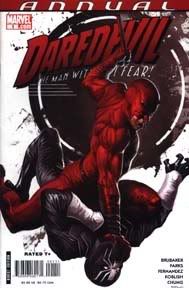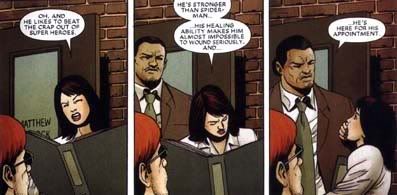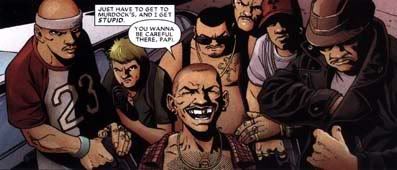Nota a los seguidores de la edición en Castellano de Panini: para los que sepais inglés, recordad que actualmente hay un año de diferencia entre la edición USA y la española de Daredevil, eso quiere decir que en este post sobre "Daredevil" Vol. 2 Annual#1 hay spoileracos como una casa de payés. Avisados estais.

Annuals are often a strange event, sometimes offering irrelevant fill-in stories, sometimes re-printing old stuff, sometimes linking different series into a particular saga or event.
The recent Daredevil Annual, plotted by regular series writer Ed Brubaker, scripted by Ande Parks and with Leandro Fernandez and Scott Koblish doing the pencils and inks, has been a nice surprise. The story is placed sometime between the restoring events in DD#93 and the ongoing saga which started in DD #95, that is, during a period of relative peace in Matt Murdock's life. It is an independent, autoconclusive story, which doesn't detract from the regular series', even though the events taking place here might reverberate in future stories.
The story deals with Daredevil having to fight both a gang of Yakuzas and a flu virus which is impairing his radar (yes, he should stay at bed, but you know Matt). At the same time, Carlos LaMuerto, a.k.a. the Black Tarantula, is released from Ryker's on parole. His experience in prison, depowered, and surely his being badly wounded by Bullseye at the prison's big riot, has caused him to reflect upon his life.
After a disappointing meeting with a corrupt parole officer, LaMuerto heads to a Lawyer's firm we know to ask for a legit job to an old acquaintance at Ryker's: Matt Murdock. Murdock, while aware of Black Tarantula's past criminal ways, is keen on giving him a second chance "(Carlos) was always straight to me... even in his threats". So Matt asigns LaMuerto to help his investigator Dakota North in a misterious murder case at Hell's Kitchen. Carlos and Dakota's styles are bound to clash: she the systematic and cartesian investigator, he the action man, who believes that no database is as efficient as a good beating to the proper squealer... So after a nearly disastrous attempt to use Dakota's computer, Murdock reaches the conclusion that maybe Black Tarantula will be better help against the Yakuza gang. And while he is, he finds difficult to work by Murdock's stick-to-the-law methods.

Chabon meets "super-white-lady"
On his intended way to redemption, Carlos bumps into his past: a neighbourhood crimelord, "Little Loco", whom he introduced to a life of crime when he was an innocent young boy. LaMuerto is going to be haunted by the bad seeds he planted in the past, for now former grasshoper "Little Loco" is the master, and he's spreading the iniquity now Carlos wants to fight against.
Will the Black Tarantula redeem himself? Maybe, but he's not going to do it in the way he or Murdock had expected at first.
This annual gives a nice focus on Carlos LaMuerto, and I add my voice to those who have claimed that his return to the streets should be either the herald of a good mini-series, or at least, make him a regular visitor to the "Daredevil" series. This was a good tale of a tainted man who wants to get his act clean, but is maybe too burdened by teh weight of his past life to just make a tabula rasa. He certainly comes from here as an interesting character to keep an eye on.
Many hispanic characters, or cultural elements, in Marvel comics, have often been poorly portrayed: the prevalent idea is the over-simplification that Hispanic culture is Mexican culture. But here, and I suspect that artist Leandro Fernandez has had a hand on it, we get touches which take Carlos profile as a latino beyond the Mariachi scene, i.e. we see carlos eating churros instead of burritos, and wearing a tatoo written in lunfardo slang (I must say, though, that a name like "LaMuerto" sounds very strange, not to say funny, to a native Spanish-speaker, LOL).

Luisito "Little Loco" and his gang: no "Backstreet Boys"
Another interesting point of the plot is that the crimes Daredevil usually fights against are thieving, murder, drug-dealing and pimping, but maybe Old Hornhead should add real state speculators, as the gentrification of the neighbourhood might be the greatest menace Hell's Kitchen ever faced, specially when people involved in it has no scruples.
Incidentally, I've read some comments online by people who had known Carlos LaMuerto previous appearances in the Spiderman series, and dislike the way he is portrayed here. The claim is that he is not the Black tarantula they had seen portrayed as a webcrawler nemesis. I personally like the way Brubaker and Parks have presented him here, so I'd argue that in this annual we don't get a full briefing of Black Tarantula's past, only a few glimpses: so this story doesn't necessarily invalidate previous ongoings. Also, Carlos' time and experiences in prison might given him a new view on things. And, again, I feel we can judge the way Black Tarantula is portrayed for one story, I have the impression that we've not seen the last of him, and Brubaker has certainly shown that he's someone that respects continuity, so, as far as I'm concerned, I'm going to stay tuned.


2 comments:
Pues el mes que viene se publica aquí éste número. Parece que tiene peor pinta que la serie regular...
De todas maneras, és la mejor colección de Marvel de largo.
Hombre, tal vez no llegue a los nivelazos de la serie regular, pero la historia es más que digna.
Lo interesante es que se trata de una historia que acaba y empieza en el mismo número (cosa cada vez más rara en los cómics Marvel, je, je), y por otra parte, es parte del plan que tiene Brubaker para ampliar el reparto de Daredevil: Tarántula Negra, a quien nos presentó en la estancia carcelaria de Murdock, se va a convertir en un personaje de referencia, amigo/enemigo del vengador escarlata.
Post a Comment